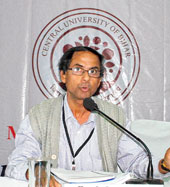 |
| Sunil Ray, dean of school of social sciences, Central University of Bihar, addresses the development meet at a hotel on Friday. Picture by Jai Prakash |
Students taking admission in Central University of Bihar from July this year will reap the benefits of five-year integrated courses.
Those taking admission in these courses enter at the undergraduate level after passing out of school, and get direct admission to the postgraduate level.
Vice-chancellor Janak Pandey said the four new courses would be five-year integrated law; BA, BSc and BEd; MPhil and PhD; and a masters programme in science. The number of courses offered by the university would increase to 20 after the new ones are introduced.
He added: “Once we have successfully launched 20 courses, we shall approach the UGC (University Grants Commission) to start new courses in the Twelfth Five-Year Plan.”
According to UGC directions, all central universities are supposed to offer 20 courses in the Eleventh Five-Year Plan. The Central University of Bihar was unable to launch the courses earlier because of logistical problems.
Another major problem that the university had faced since its inception was the disagreement between the Centre and the state about where it should be established. While the state government wanted its address to be Motihari, the Union government demurred, claiming that the north Bihar town did not have proper infrastructure.
Finally, it was decided that Bihar would have two central universities — this one would shift to Gaya and a new one would be established in Motihari. Source said the university is now planning to start engineering courses.
On Friday, a three-day development meet organised by the centre for development studies of the university, also started.
Amiya Kumar Bagchi, chancellor, Central University of Tripura — one of the guests at the programme — said: “Interdisciplinary education is the need of the hour. Universities should tailor courses so that students of one subject also have some knowledge of other disciplines. For instance, a student of history should not be ignorant of the science subject and vice-versa.”
Education department principal secretary Amarjeet Sinha, who was also a guest at the launch, said development should be inclusive.
“Health, nutrition and education are three major parameters of development,” he said, adding that economic growth should be necessarily related to human development and gave the example of former Soviet countries that had a good human development index without widespread economic growth.
Sinha said: “Bihar was one of the most under-developed states in the country. But over the last three or four years, the state has achieved a remarkable growth in human development.” As example, he cited decline in infant mortality and death rates. “Inclusive growth aims to provide equal education and environment to every child.”










